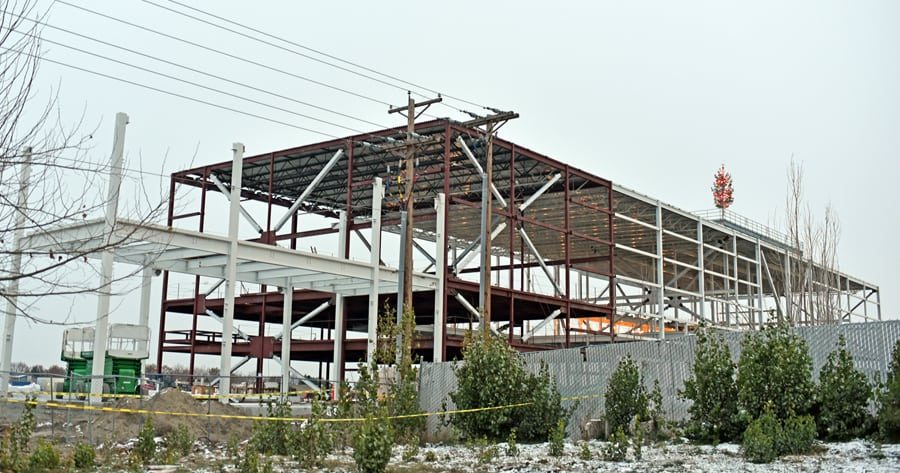
Home » TRIDEC points to successes as it looks ahead to 2017
TRIDEC points to successes as it looks ahead to 2017

December 15, 2016
The Tri-City Development Council has seen an uptick in companies interested in doing business in the Tri-Cities in 2016.
“We’re responding to inquiries all the time,” said Carl Adrian, president and CEO of TRIDEC. “In fact we’ve received more inquiries in the last six months than we have in the 12 months prior. Whether that continues or why it’s happening I can’t predict, but there is activity and new projects here all the time.”
Those inquiries come from corporations interested in moving — or expanding — to the Tri-City area and total more than $640 million in capital investments and more than 1,000 jobs. Adrian said the likelihood that all those will end up coming here is slim, but it speaks to the growing popularity of the area.
“It’s a pretty broad range (of industries) but the majority has been food processing, which fits with what our targets are,” Adrian said.
AutoZone’s new distribution center and truck maintenance facility was one of 2016’s big accomplishments, Adrian said.
Work on the 440,000-square-foot center began earlier this year at 3733 Capital Ave. near King City in Pasco.
The new business will create more than 200 jobs in the Tri-Cities once it’s fully operational in the second quarter of 2017, Adrian said.
The company paid $3.6 million for the 93-acre site and its building permit was valued at $38.9 million.
“It’s a large capital project and a pretty big deal for the community. They’ll distribute to retail stores across the Pacific Northwest,” Adrian said. “It really puts us on the map as a location for distribution of products. We believe that other retail companies that have similar retail patterns will see this and look to the Tri-Cities as a result.”
TRIDEC played an integral role in site selection for the project in 2015 after the Washington Department of Commerce contacted the organization early in 2015. AutoZone had been scouting locations from Yakima to Pendleton.
“The state has a program called strategic reserve funds to provide incentives for site investigation and to defer initial costs of the project. TRIDEC was the lead in investigation,” Adrian said.
Another big economic development win was the nearly $200 million LambWeston/ConAgra Foods investment for a second French fry processing line at its food manufacturing plant in Richland.
When it is completed in 2017, the expansion will add 128 jobs to the 500 jobs already at the existing Richland plant. TRIDEC assisted in creating the incentive package for the expansion.
“They had been evaluating other plants and selected Richland for the expansion,” Adrian said. “It really puts us on the map for the food processing industry.”
“We work to create an atmosphere so that companies can grow and prosper in the community. Attracting new companies creates a multiplier effect. Not only is hospitality experiencing a positive impact but also service industries are able to expand,” Adrian said.
This year TRIDEC hosted its second annual food and beverage expo, FABREO, which stands for Food and Beverage Retention and Expansion Opportunities, and sponsored a startup boot camp to give local food and beverage companies an opportunity to present to brokers and buyers.
“We’re mindful of the growing entrepreneurial network in the community and we look at ways of supporting that,” Adrian said.
Advocating for responsible use of land for economic development, TRIDEC finalized a significant deal to transfer 1,641 acres of unused Hanford land from the Department of Energy to the Port of Benton, city of Richland and Energy Northwest in 2016.
“The idea is to develop the land for industrial uses. Master planning is currently underway,” Adrian said. He said Energy Northwest is considering using 300 acres to build an energy park.
“They’ve expressed interest in opening a solar project there. It would be like a utility scale energy demonstration project for energy storage and solar energy. It will not likely be used for wind or biofuels,” he said.
Next year TRIDEC will continue its work to advocate on land use issues. TRIDEC is already backing the return of Columbia River shoreline land owned by the Army Corps of Engineers to the city governments. The Corps acquired the land after the major flood in 1948.
Gary Petersen, vice president of federal programs for TRIDEC, is working closely with retired U.S. Rep. Doc Hastings and former Kennewick Mayor Brad Fisher on the initiative.
A provision in a proposed National Defense Authorization bill would require the Army Corps of Engineers to disclose what rivershore property it owns and how much they paid for it. Then the group would need to convince Congress to transfer the land to the community.
“If it passes, it would give the community time to assess whether it makes sense to pursue a land transfer,” Adrian said. “There is no saying what kind of recreation amenities would occur, but the whole issue is that local control is better — at least the local community makes decisions on the land instead of federal government and I agree with that.”
TRIDEC also has been vocal about keeping the four Lower Snake River dams in place.
In late November, Adrian spoke at a public hearing after several environmental groups and a U.S. District Court judge asked that dam deconstruction be considered to protect wild salmon runs.
“Our position right now is that the economic cost to the region, increased power costs and transportation costs far outweigh benefits. TRIDEC has been very active in keeping the dams since the 1990s,” Adrian said.
Local News Year in Review
KEYWORDS december 2016




